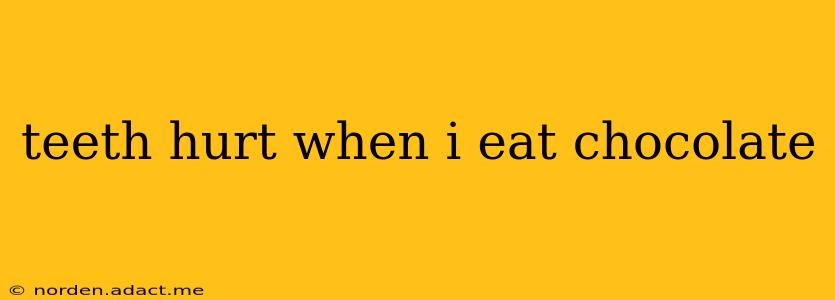Many people enjoy the rich indulgence of chocolate, but for some, this sweet treat comes with an unpleasant side effect: tooth pain. If your teeth hurt when you eat chocolate, you're not alone. This common problem can stem from several factors, and understanding the root cause is key to finding relief. This comprehensive guide explores the potential reasons behind your chocolate-induced toothache and offers solutions to help you enjoy your favorite confection without the pain.
Why Do My Teeth Hurt When I Eat Chocolate?
The sensitivity you experience when eating chocolate isn't necessarily a direct result of the chocolate itself, but rather a reaction to its properties and your existing oral health. Let's delve into the most common culprits:
1. Temperature Sensitivity:
Chocolate, particularly when cold or very warm, can trigger pain in teeth with exposed dentin. Dentin is the layer beneath the enamel, and when enamel wears down or is damaged (from cavities, gum recession, or teeth grinding), the dentin's nerve endings are exposed, making your teeth sensitive to temperature changes. Cold chocolate can cause a sharp, shooting pain, while very warm chocolate may induce a dull ache.
2. Acid Sensitivity:
Some chocolates, especially dark chocolate, contain acids that can erode tooth enamel over time. This erosion exposes the dentin, leading to increased sensitivity. The acidity in chocolate can also temporarily weaken the enamel, making teeth more vulnerable to pain from temperature changes or sugary foods.
3. Sugar Content:
High sugar content in chocolate feeds bacteria in your mouth, producing acids that contribute to tooth decay. Cavities cause tooth pain, and the pain can worsen when you eat sweet foods like chocolate, which are ideal food sources for bacteria.
4. Existing Dental Issues:
Underlying dental problems, such as cavities, cracked teeth, gum disease (gingivitis or periodontitis), or poorly fitted dental restorations (fillings, crowns), can exacerbate pain when consuming chocolate. Chocolate’s texture and temperature can aggravate these existing conditions.
5. Temporomandibular Joint (TMJ) Disorder:
While less common, TMJ disorders can cause jaw pain that radiates to the teeth. Chewing on chocolate, particularly hard chocolate, can aggravate TMJ symptoms and lead to tooth pain.
How Can I Prevent Tooth Pain When Eating Chocolate?
Fortunately, there are several steps you can take to mitigate or prevent chocolate-induced tooth pain:
Choose Your Chocolate Wisely:
- Opt for milk chocolate over dark chocolate: Dark chocolate generally has a higher acidity level than milk chocolate.
- Limit your intake: Moderation is key. Enjoy chocolate in small portions rather than indulging in large quantities at once.
- Choose less sugary options: Look for chocolates with lower sugar content.
Maintain Excellent Oral Hygiene:
- Brush twice daily: Use a fluoride toothpaste to strengthen enamel and protect against acid erosion.
- Floss daily: Removing food particles and plaque is crucial to prevent cavities.
- Use a mouthwash: An antibacterial mouthwash can help control bacteria and reduce acid production.
- Regular dental checkups: Visit your dentist for regular checkups and cleanings to address any underlying issues early on.
Other Considerations:
- Desensitizing toothpaste: If you have temperature sensitivity, a desensitizing toothpaste can help block the nerve endings in your dentin.
- Avoid extremely hot or cold chocolate: Allow chocolate to reach room temperature before consuming.
- Address underlying dental issues: Seek professional dental care to treat any cavities, gum disease, or other dental problems.
What Should I Do If My Tooth Pain Persists?
If you experience persistent tooth pain despite taking preventative measures, it's crucial to consult a dentist. They can diagnose the underlying cause of your pain and recommend appropriate treatment. Delaying treatment can lead to more significant dental problems.
By understanding the potential causes of chocolate-induced tooth pain and implementing these preventative measures, you can enjoy your favorite treat without the discomfort. Remember that maintaining excellent oral hygiene is crucial for long-term dental health.
